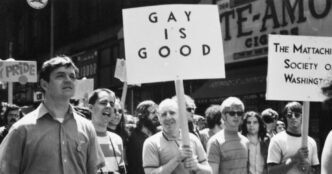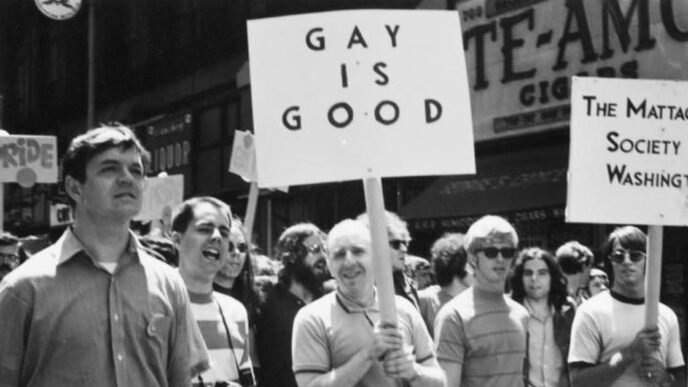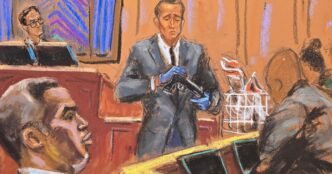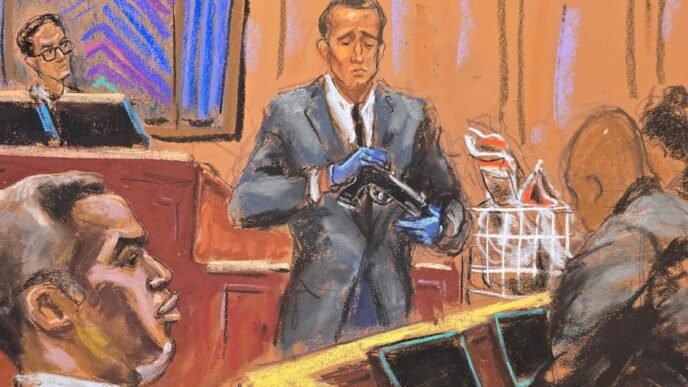A Manhattan judge sentenced three men to decades in prison on Wednesday for facilitating a years-long drug-induced robbery scheme at New York City gay bars that ultimately killed two men.
Jayqwan Hamilton, 37, Jacob Barroso, 32, and Robert DeMaio, 36, were found guilty in Febru of committing murder, robbery and conspiracy in connection with the scheme that lasted from March 2021 to June 2022. Julio Ramirez, a 25-year-old social worker, and John Umberger, a 33-year-old political consultant, were murdered in the spring of 2022 in the scheme.
All three of the defendants were convicted of murdering Ramirez. Two of them, Hamilton and DeMaio, were convicted of murdering Umberger. Hamilton and Barroso spoke at the sentencing on Wednesday and maintained their innocence.
Hamilton and DeMaio were sentenced to 40 years to life in prison, and Barroso was sentenced to 20 years to life.
“This was a cold and calculated pattern,” Judge Felicia Mennin said at the Wednesday sentencing hearing. “I pity your lack of empathy. But pity will not translate into leniency in this case.”
During the three-week trial, prosecutors said the trio worked together to drug and rob five men after meeting them outside popular city gay bars and nightclubs.
The defendants drugged the victims to the point of unconsciousness — using a concoction that included fentanyl — before using their lifeless faces to gain access to their cell phones, using facial recognition technology. Once inside the victims’ cell phones, the men stole thousands of dollars out of their banking apps and used payment apps to purchase food, shoes, alcohol and other items, prosecutors said.
“I’m sympathetic towards the victims and their families. However, I disagree with the verdict. I maintain my innocence,” Hamilton said at Wednesday’s hearing in New York criminal court. “My actions weren’t deadly at all, but I made some mistakes and I regret them.”
Friends and family members of the defendants and the two victims, including Umberger’s father, who traveled from the UK, attended the hearing, sitting on opposite aisles of the courtroom packed with about 100 people. Manhattan District Attorney Alvin Bragg also appeared at the sentencing and sat in the front row of the courtroom as victim statements were underway.
Carlos Ramirez told the court that his brother, Julio, was his best friend who had “just begun building his life” and his career as a mental health counselor before his death.
“What happened to my brother wasn’t just tragic, it was intentional…it was evil,” Carlos Ramirez said. “What’s worse, he was left alone while the people responsible continued their lives [and] my family was shattered.”
He then asked Judge Mennin to sentence the men to life in prison without the possibility of parole, arguing that they are a “threat to society.” Ramirez’s parents also spoke, reiterating the request for “real justice.”
Umberger’s mother, Linda Cl, told the court that losing her son is “truly the greatest pain and worst pain in the world” and that “this was preventable and this should not have happened.”
“I also know that one of the greatest things John taught is that every problem is an opportunity. And through this tragedy, there has been so much love,” Cl said during her emotional impact statement.
Assistant District Attorney Meghan Hast said Wednesday that after Umberger was murdered, he was left on the bed of his townhouse while Hamilton and DeMaio went on a shopping spree. At trial, prosecutors also showed a video recorded by DeMaio and Hamilton at the townhouse where Umberger was staying, celebrating near his body the night of the murder.
“I would like to pause for 13 seconds to acknowledge the video that was made while my son died, and you did nothing to help,” Cl said in her victim impact statement.
Prosecutors asked the court to sentence Hamilton and DeMaio to 40 years to life in prison and Barroso to 25 years to life in prison. Lawyers for the three defendants asked the court for a more lenient sentence and noted that they all plan to appeal the conviction.
“In this case, no one was supposed to die. That’s the tragedy. No one intended to murder these young men,” DeMaio’s attorney, Dean J. Vigliano, said Wednesday.
The crimes didn’t come into broad public view until May 2022 — more than a year after the scheme began — when NBC News reported on the mysterious death of Ramirez.
Ramirez was found dead in the back of a taxi cab after encountering the men at the Ritz Bar and Lounge, a gay bar in the heart of Manhattan’s Hell’s Kitchen neighborhood.
Umberger was found dead in a Manhattan townhouse where he was staying, days after he met two of the convicted men outside of nearby, and now closed, The Q. During the trial, prosecutors showed video of the men partying inside the townhouse alongside Umberger’s unconscious body.
Both men had a concoction of drugs in their systems, including fentanyl, lidocaine and cocaine, according to the city’s medical examiner’s office.
At trial, the defense argued that it was impossible to know which drugs killed the two men, pointing to the fact that some of the victims used illicit drugs recreationally.
Once NBC News reported Ramirez’s death, more gay New Yorkers stepped forward and shared stories of surviving similar encounters. Prosecutors said that the victims were not targeted solely for financial gain — not their sexual orientation.
The New York City Police Department and the mayor’s office launched a program in 2023 to re-examine unsolved drug, robbery, and homicide cases involving LGBTQ victims, following criticism of the response from officials from surviving victims. However, authorities maintained that the cases were correctly handled.
Three other men, Eddie Ashley, Shane Hoskins, and Andre Butts, were also arrested and convicted of crimes in connection with the scheme. According to the district attorney’s office, the three other men pleaded guilty.
Throughout the same time period, a similar crime ring was wreaking havoc at bars in Manhattan’s Lower East Side, prosecutors said. The second crime scheme also led to several deaths and at least one arrest.
After the trial, Bragg called on third party payment apps to implement more stringent measures to protect consumers.
“We want to stop this type of deadly conduct from occurring at all. Part of the solution lies in addressing the profit motive that was the basis for the conspiracy,” Bragg said to reporters.













